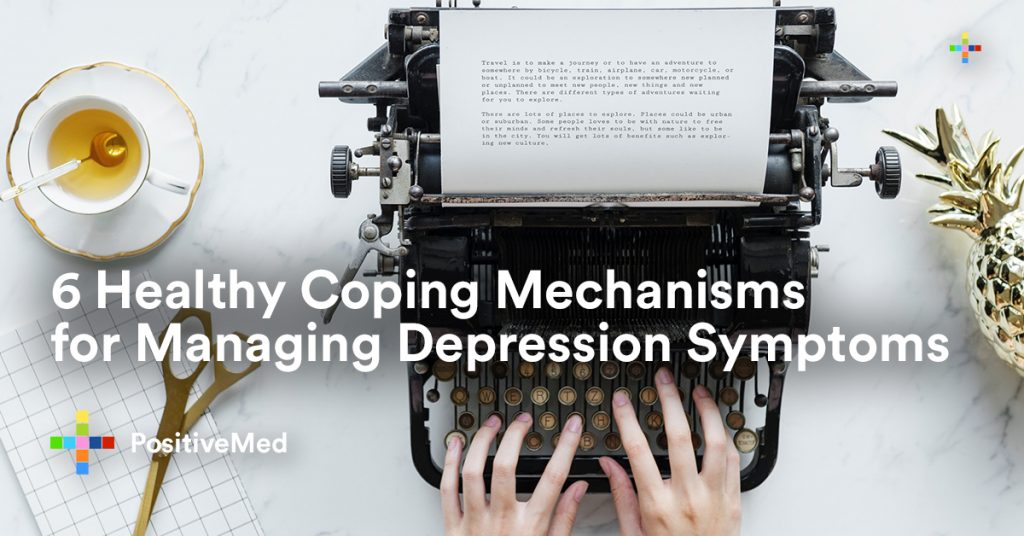Depression impacts people of all ages, genders, races, and walks of life. While it may seem hopeless, there are ways to take control and better manage your symptoms to live a healthier and happier life. While transcranial stimulation and prescription medications may be useful in minimizing symptoms, there are things you can do in your everyday life to keep depression symptoms at bay.
Keep reading to learn about 6 healthy coping mechanisms that will help you to manage your depression symptoms.

1. Minimize Stress
No one lives a stress-free life, but we do have the ability to control what stresses us and how we interact with our stressors. One of the simplest lifestyle changes you can make to minimize depression symptoms is to reduce stress. Dealing with stress on top of being depressed is a recipe for disaster.
To get better control of your stress levels, identify what stresses you and ways to manage it. In over your head at work? Ask for help! Having trouble managing your busy schedule? Learn to use a daily planner. At the least, know the importance of taking a deep breath and centering yourself.
2. Write It Out
You don’t have to be an English or journalism major to put your thoughts and feelings on paper. Keeping a personal diary is a great way to manage depression. All too often we’re guilty of keeping our thoughts and feelings to ourselves. In turn, they can fester and become even bigger problems over time.
Writing is therapeutic and is a safe way to relieve stress. While you may find it hard to be 100% truthful with friends or family members, your journal is a safe place to write about your rawest feelings. After putting pen to paper, you’ll be surprised at how much better you feel. Putting things on paper lifts a huge weight off of your shoulders.
Related Link: 6 Specific Depression Types and Their Symptoms
3. Improve Your Self-Image
Self-image is all about how you see yourself. Your self-image also includes self-esteem and self-confidence. When’s the last time you said something nice about yourself? Do you truly love who you are inside and out? People who suffer from depression also tend to have a
One of the best things you can do to minimize depression symptoms is to find ways to feel better about yourself and to embrace who you are. While it’s easy to find flaws in ourselves, turn the tables and instead practice positive thinking. Jot down your best qualities and read them to yourself each day.
Other ways to feel good about who you
4. Aim for Quality Sleep
One of the most common signs of depression is troubles sleeping, including falling or staying asleep. On the same hand, not getting enough sleep can worsen depression symptoms. As a rule of thumb, you’ll want to aim for at least 8 hours of sleep each night. If you can’t seem to improve your sleep, try these tips:
• Have a strict schedule
• Avoid nighttime distractions such as the television or your phone
• Relax an hour before bedtime
• By getting enough quality sleep, you’ll notice your depression symptoms start to lessen.
5. Set Goals
When you’re depressed, you may feel as if you’re getting nowhere in life. To transform this thinking process, it’s important to set goals that you can work towards achieving. Write down both short and long-term goals. Maybe you want to go back to school or maybe you’re ready to apply for a new position within your company.
Goal setting not only gives you something to work towards
6. Know How to Relax
Along with managing stress comes the importance of knowing how to relax. Having depression can make you feel as if you’re always on-edge or worrying about something. Put your mind and body at ease by relaxing throughout the day. No matter if you’re juggling taking care of your children or trying to meet a tight deadline at work, it never hurts to take a step back and relax.
One of the best ways to relax is to practice deep breathing exercises. These can be done anywhere at any time and can be a huge help when times are rough. Yoga and stretching are also great ways to relax and to take your mind off of things.
Conclusion
Living with depression is no easy feat, but even on those days when you’re extremely down, know that you’re more than this health condition. Practice these 6 healthy coping mechanisms to manage your depression symptoms. Here’s to brighter days ahead!







